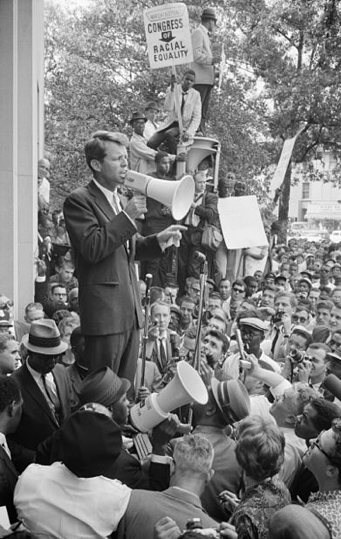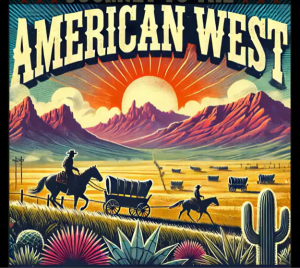On March 16, 1968, Robert F. Kennedy declared that he was running for president of the United States. Robert Kennedy was a humble man, stating that he was not running for president to oppose any man, but to propose new policies. With his brother leaving a big impact on so many, Robert F. Kennedy had big shoes to fill. The start of his pursuit for the presidency of the United States began when he became the 64th US Attorney General on January 21, 1961. On November 22, 1963, Robert lost his older brother, John F. Kennedy, after he was fatally shot in Dallas.1
After his brother had been killed, Robert Kennedy resigned as Attorney General less than a year later, in September of 1964. Wanting to do something different, Robert announced his intent to run for Senate. He successfully became the Senator of New York in 1965 and then began advocating for the poor, for human rights, and against racial discrimination. But he wondered to himself whether he should run for president or not.2 However, he wasn’t motivated to pursue the presidency because of many factors, one of them being his brother’s assassination.
Robert Kennedy was a prominent member of the Democratic Party. Kennedy had liberal views for what he thought would be better for the people of the United States. He thought that everyone should be treated equally and be treated like human beings. He wanted to desegregate schools, and wanted all people to enjoy the same rights. After waiting anxiously and not knowing whether he would run for the Democratic Party’s presidential campaign or not, he finally decided he would run for president, and his presidential campaign began in March 1968. He was prepared to take a risk in order to accomplish what he wanted and what he believed in.3 Something inside of him wanted to make a difference and change America for the better. He was actually a late entry in the primary race for the Democratic Party’s presidential nomination.
Kennedy focused on the issues of social improvement, economic justice, and racial equality. The Democratic Party supported Robert F. Kennedy and they helped him launch his presidential campaign. On March 16, 1968, Robert Kennedy’s presidential campaign began, even before Lyndon B. Johnson announced he wouldn’t run for re-election. He was willing to challenge Johnson for the nomination, which was clearly a risk.

Robert Kennedy gave his first campaign speech at Kansas State University, where he drew a record crowd. In his speech, he spoke out about ending the Vietnam war, then he continued on to the matter of poverty, emphasizing the horror he felt when he saw what poor Americans had to face every day. Towards the end of his speech, he quoted George Bernard Shaw: “Some people see things as they are and say, why? I dream things that never were and say, why not.”4 This quote would become the centerpiece of Kennedy’s presidential campaign and help express the mindset he had about what he wanted to do if he became president. He wanted to create things and change things.
Youth engagement was critical for his campaign. He tried to inspire young leaders, and he created a national resource center for juvenile justice, by giving opportunity to juveniles to do more with their lives. His political platform was structured around racial equality and economic justice. He supported non-aggression in foreign policy, and social improvement for the poor and for people who were segregated.5 Robert F. Kennedy wanted to desegregate schools and wanted every American to have the same rights as every other American. He even spoke to civil rights activist Cesar Chavez, who was just ending a 25-day hunger strike over the treatment that farm workers were enduring.
On March 31, Lyndon B. Johnson stunned the nation by dropping out of the presidential race. At that time there were only fourteen states that held primary elections: California, Florida, Illinois, Indiana, Massachusetts, Nebraska, New Hampshire, New Jersey, Ohio, Oregon, Pennsylvania, South Dakota, Wisconsin and West Virginia. Robert Kennedy had won two primary states: Indiana and Nebraska. When Martin Luther King Jr was shot, on April 4, 1968, Kennedy gave an improvised speech in Indianapolis, Indiana, speaking at two universities. He then boarded a plane to attend campaign rallies, honoring the death Martin Luther King Jr emphasizing his love for life and justice for the people. Robert Kennedy began addressing the people, asking them whether the nation would choose to continue to be segregated and fall apart, or whether it would move together as a country to achieve more. King’s death was an important moment that made many people see that a change was needed.6 Kennedy was behind Hubert Humphrey, Johnson’s Vice President, who had entered the race after LBJ declined to run. At the time, Humphrey was seemed to have an advantage over Kennedy in delegate support, but a victory in California’s primary could turn the tide in Kennedy’s favor.

Things were beginning to look good for Robert F. Kennedy. Then, suddenly, things took a stunning turn for the worst.
On June 5, 1968, presidential candidate Robert F. Kennedy was at the Ambassador Hotel in Los Angeles. It was the evening of the California primary, and the results were just coming in that Kennedy had won both South Dakota and California. He gave a triumphant victory speech, speaking to journalists and campaign workers and supporters. The speech was carried live on television. His victories in the California and South Dakota primary elections gave Kennedy the boost he needed to go into the Democratic Party Convention that summer with confidence that he would win the Democratic nomination for President of the United States. After leaving the podium and exiting through a crowded kitchen hallway, he began to have a conversation with a busboy named Juan Romero. Juan Romero was very grateful that a simple busboy like himself was able to interact with the potential president of the United States. But in the blink of an eye, while shaking the hand of Juan, Robert Kennedy came face to face with a 24-year-old Palestinian immigrant named Sirhan Sirhan. Sirhan suddenly shot Kennedy multiple times with a .22 caliber revolver. Kennedy’s body immediately dropped to the floor and everyone was in shock. Kennedy was later transferred to the Good Samaritan Hospital, where he was pronounced dead the following day.7
After Kennedy’s death, Juan Romero said, “This made me realize that no matter how much hope you have, it can be taken away in a second.”8 Kennedy’s remains were then flown back to St. Patrick’s Cathedral in New York for public viewing before a funeral mass. Thousands of mourners attended in order to see Robert Kennedy’s lifeless body. His blood-stained shirt, tie, and jacket are now in the possession of the Los Angeles County District attorney. Kennedy was then buried near his older brother John Kennedy, in Arlington National Cemetery.
It was later revealed during a search of Sirhan’s home that he held strong anti-Zionist beliefs and, in a diary, he wrote that he was determined to kill Robert Kennedy before June 5, 1968, because that was the first anniversary of the start of the Six-Day War between Israel and its Arab neighbors, and he resented Kennedy and his beliefs. He just held an overpowering hatred for Kennedy. He expressed that hatred toward Kennedy when he found out that Kennedy supported Israel and his attempt to send fifty bombers to Israel to harm the Palestinians. Sirhan was sentenced to death, but it was later commuted to life in prison.9

Later on, as the 1968 election progressed, Richard Nixon won the presidential election. Many believe Kennedy would have ultimately secured his nomination after successfully winning the California primary, were it not for his tragic death; and that he would have gone on to be elected president.10
After Kennedy’s death, things turned into chaos for the Democrats. The Democratic National Convention was held in Chicago in August. The purpose was to select a new presidential nominee to run as the Democratic party’s candidate for office. The Democratic Party ended up choosing Humphrey to run. But the way he was chosen was anything but civil. Party members and the Left were left devastated and demoralized in the wake of Kennedy’s death. Chicago was chaotic, both inside the convention hall and outside on the streets. One can only wonder how it all would have gone, had Kennedy lived.
- Robert F. Kennedy (John F. Kennedy Presidential Library and Museum), May 20, 2017. Accessed August 30, 2018. ↵
- Thurston Clarke, The Last Campaign : Robert F. Kennedy and 82 Days That Inspired America (New York : Henry Holt, 2009, 37-46. ↵
- Diane Nixon, “The Case of the Robert F. Kennedy Assassination Investigation Files,” The Public Historian (2008): 11, 29-35. ↵
- Ray E. Boomhower, Robert F. Kennedy and the 1968 Indiana Primary (Bloomington, Indiana University Press, 2008), 35-41. ↵
- Nora Rawlison and Robert F. Nardini, “Robert Kennedy,” Library Journal 113 (13) (1988): 156-162. ↵
- Micheal Rosenwald, “Robert F. Kennedy’s Remarks on the Assassination of Martin Luther King Jr,” The Journal of Blacks in Higher Education 55 (2007): 5. ↵
- Mel Alyom, Sirhan Sirhan and the Assassination of Robert F. Kennedy (Washington D.C.: 1st Ed Potomac Books, 2007), 60-67. ↵
- John Rogers and Russell Contreras, “Busboy Comforted a Dying Robert Kennedy,” Globe & Mail (Toronto, Canada 2018). ↵
- Ilene Cooper, The Assassination of Robert F. Kennedy (American Library Association / Booklist Publications), 44-50. ↵
- Kenneth Walsh, Shattering the Hope (U.S. News. June 1, 2017) Accessed September 9, 2018. ↵



67 comments
Didier Cadena
This was a very interesting article. I was a bit familiar with Robert Kennedy’s assassination, so it was great to be able to read a bit more of it. It was sad to see how a man so full of promise and hope to have his life ended so early. It really makes you think what could have happened if he wasn’t killed. The article does a great job of putting all of the information together and still make it interesting to read.
Devin Ramos
The Kennedy brothers were trying to help all the people within the country especially during a time when civil rights were such a massive problem in the country. The Kennedy Curse is something I believe in to see how many of the family members have had unexpected deaths in their careers. I also feel like the democratic party chose the wrong person to follow in Kennedy’s footsteps and be the new nominee.
Angel Torres
Good informative article on Robert Kennedy. I’ve never known much about Robert Kennedy besides his assaidnation. Roberts’s assasination is very unfortunate, looking at the results from the primaries it seemed like he was going to win the nomination. Robert Kennedy capitalized on all the events that occurred as he was running for president. The assasination of MLK led many people to realize change is necessary and Roberts campaign was the change they needed.
Adam Portillo
I really enjoyed reading this article and I felt that it really went into detail on the life that RFK lived leading up to his assassination. It definitely would have been interesting to see that the outcome of RFK’s campaign. It’s sad to see that prominent people who only want to make a change for society often get assassinated for conflicting ideas nonetheless RFK’S legacy goes on. Great article.
Ariana Melendez
This was a very informative article due to its description of candidate Robert Kennedy’s campaign. The Kennedys appear to be men who were publicly supportive of better human rights and strove for more than other candidates did. It’s interesting to see that Robert Kennedy was considered a liberal for things that are a norm in our day. For example, the desegregation of schools and people of color no longer exists and that was something he advocated for.
Enrique Segovia
Robert Kennedy seemed to have great ideas for the United States. With his older brother, John. F. Kennedy, having been shot some years before while he was the President, Robert had to gather a lot of courage to run as a presidential candidate. I had never heard of the assassin of Robert Kennedy, so it was astounding to learn that he was a Palestinian immigrant. Even though he had great ideas for the country, he could never take action on them.
William Rittenhouse
This was a very tragic thing that happened to 3 major figures at that time. Both the Kennedy’s as well as Martin Luther King Jr. All 3 were very big supporters of human rights, all rights which meant the right to life. They were Democrats that were pro-life, anti-discrimination and anti-racism. They all truly believed in making a change and difference during that time. These figures would be figures that changed the way we look at civil rights now adays.
Jasmine Rocha
The article was very informative and well written about the assassination of John F. Kennedy younger brother Robert F. Kennedy. Unfortunately, both brothers were met with the same fate as they were both assasinated. Robert was running for president around the time he was killed, he had great ideas and accomplished mnay things in government it is veyr unfortunate that both the Kennedys’ especially Robert in this article were not able to accomplish much becuase of their fate.
Lynsey Mott
I think it is very sad on both the deaths of the Kennedys. Its is really upsetting that people will go to the extreme to kill someone just because they don’t like they way they talk, act, or even how they run for presidency. I really don’t think people understand how it affects not only the person they killed, but the family. This article really shows the depth of losing both of the sons, and how they struggled with the pain.
Micaela Cruz
The assassination of the Kennedy’s has always been interesting to me but their deaths are true tragedies in US History. Robert Kennedy could have accomplished so much had he not been assassinated and could have turned things around for the country. It’s a shame that he could not fulfill his goals but justice was served to Sirhan Sirhan. Overall, this article was a great and interesting read; may the Kennedy brothers rest in peace.